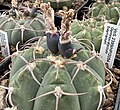Description
Gymnocalycium bayrianum grows individually with blue-green, reddish, flattened, spherical shoots and reaches heights of 4 to 5 centimeters with diameters of up to 10 centimeters. A large shoot and a taproot are formed. The six to ten ribs are broad and flat at their base and notched above each areole. Central spines are usually not present, but sometimes one is formed. The usually five bent-back, light brown marginal spines have a darker tip and turn gray with age. They are up to 3 centimeters long.
The funnel-shaped, creamy white flowers are up to 3 centimeters long and reach a diameter of 4 centimeters. The gray-green, bluish-tinged fruits are elongated. [3]
This page is based on this
Wikipedia article Text is available under the
CC BY-SA 4.0 license; additional terms may apply.
Images, videos and audio are available under their respective licenses.



